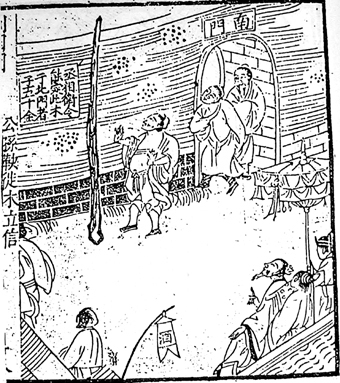He uses this stick to tell everyone that he
will do what he says(立木為信)
From 475 BC to 221 BC, there were a total
of 254 years. This period is called the Warring States Period in Chinese
history.
During this period, China was divided into
more than 20 small kingdoms, 5 medium kingdoms and two large kingdoms.
These kingdoms competed with each other for
resources and wars broke out everywhere.
The kings of these kingdoms all hope to
make their kingdoms the most powerful of all kingdoms by reforming systems and
laws, and the king of the Qin Kingdom is no exception.
The King of Qin has hired a very wise man
to be responsible for promoting a series of institutional reforms. This person
is called (Wei Yang).
(Wei Yang) After being given this important
task, he believed that before any reforms could be carried out, all the people
of the Qin Kingdom must first believe that all the reforms promoted by the
government would be implemented.
But how do you build people's trust in the
government?
He found a way.
One day, he placed a thin stick outside the
city gate on the south side of the capital.
Next to the stick he placed a proclamation
bearing the king's seal.
The proclamation said that anyone who could
move the stick to the northern gate of the capital would be rewarded with ten
gold coins.
His behaviour and the proclamation
attracted the attention of the people. Many people gathered around the stick
and the announcement, but no one moved the stick to the northern gate of the
capital.
All the people thought that it was
impossible to receive such a large reward for such a simple task.
The next day, again because no one moved
the stick, he announced that he would increase the reward.
After the third and fourth days, the reward
continued to increase, and more and more people gathered around the stick and
the announcement, but no one moved the stick to the city gate in the north of
the capital.
By the fifth day, the reward had risen to
50 gold coins.
At noon that day, a middle-aged man
suddenly walked up to the wooden stick and picked it up. The man took the
wooden stick and walked towards the northern gate of the city.
When the onlookers saw this, they all
followed the middle-aged man to the North Gate.
(Wei Yang) sat at the north gate and
waited.
When Wei Yang saw the middle-aged man
approaching with the wooden stick, he immediately took out 50 gold coins and
said to the middle-aged man, 'You have completed your task.
You have completed the task set by the
king, so on behalf of the king, I will give you the reward gold.
The people watching around him all let out
exclamations.
Wei Yang said to the crowd.
Starting today, the king will order a
series of reforms. If you follow the new systems and laws, you will be
rewarded. If you violate these systems and laws, you will be punished.
The king promised that he would enforce
these new systems and laws. He used this stick to tell everyone that he would
do what he said and that what he promised would never change.
After this incident, Wei Yang began to
promote a series of political and economic reforms, and the reforms went very
smoothly.
The literal translation of this idiom is
that he uses this stick to tell everyone that he will do what he says.
It is used to describe a person who is very
trustworthy.
Dear friend, what inspirations or thoughts
do you have after listening to this story?
Are you a trustworthy person? Do you trust
the ongoing political and economic reforms in your country?
I hope this story can give you some new
insights.
立木為信(He uses this stick to tell everyone that he will do what he says)
西元前475年到西元前221年,共有254年,這一段時間在中國歷史上被稱作戰國時代。
在這一段時間內,中國分裂成20多個小王國與5個中王國和兩大王國。
這些王國彼此爭奪資源,到處爆發戰爭。
這些王國的國王都希望可以藉由制度與法律的改革讓自己的王國成為所有王國中最強大的王國,秦王國的國王也不例外。
秦王國的國王便聘請一個很有智慧的人來負責推動一系列的制度改革。這個人的名字叫做(衛鞅)。
(衛鞅)接到這個重要的任務後,他認為要進行改革之前,要先讓所有秦王國的百姓都相信政府所推動的所有的改革行動都會確實的執行。
但是要怎樣建立人民對政府的的信任呢?
他想出了一個辦法。
有一天,他將一根細長的木棍放在首都南邊的城門前。
他在木棍旁邊貼了一張蓋有國王的印章的公告。
這張公告上面寫著,若有人能將這根木棍搬到首都北邊的城門前,他就可以得到10個金幣的獎勵金。
他的行為與這張公告引起了百姓的注意,許多百姓聚集在這根木棍與公告旁邊,但是沒有一個人動手將這根木棍搬到首都北邊的城門前
百姓們都認為執行一個如此簡單的任務不可能就能獲得那麼高的獎勵金。
第二天,還是因為沒有人去搬動這木棍,所以他就宣布他會提高獎勵金的金額。
第三天與第四天過了,獎勵金愈來愈高,聚集在這根木棍與公告旁邊的百姓愈來愈多,但是仍舊沒有人動手將這根木棍搬到首都北邊的城門前。
在第五天的時候,獎勵金已經高達50個金幣。
這一天的中午,突然有一個中年男人走向了這根木棍並且拿起這一根木棍,這個男人拿著這根木棍走向北邊的城門口。
圍觀的百姓看見後,都尾隨在這個中年男子的後面一起走向北邊的城門口。
(衛鞅)坐在北邊的城門口等候。
當衛鞅看見這個中年男子拿這這根木棍走過來後,他立刻拿出了50個金幣並且對這個中年男子說。
你完成了國王所指定的任務,所以我現在代表國王把獎勵金發給你。
周圍圍觀的民眾都發出了驚嘆聲。
衛鞅對所有圍觀的百姓說。
從今天開始,國王會下令推動一系列的改革,如果遵守新的制度與法律就會得到獎賞,如果違反這些制度與法律就會被懲處。
國王保證他絕對會確實地執行這套新的制度與法律,他藉由這根木棍來告訴大家他會說到做到,他承諾的事情絕對不會改變。
這件事之後,衛鞅才開始推動一連串政治與經濟的改革,改革行動進行得非常地順利。
這句成語直接翻譯的意思是他藉由這根木棍來告訴大家他會說到做到。
這句成語被用來形容一個人很有信用。
親愛的朋友,你聽完這個故事有怎樣的啟發或有怎樣的想法呢。
你是一個有信用的人嗎?你信任你的國家正在進行的政治與經濟的改革嗎?
我希望這故事能讓你產生一些新的收穫。
出處為史記-商君列傳
https://zh.wikisource.org/wiki/%E5%8F%B2%E8%A8%98/%E5%8D%B7068
2025/01/06更新

